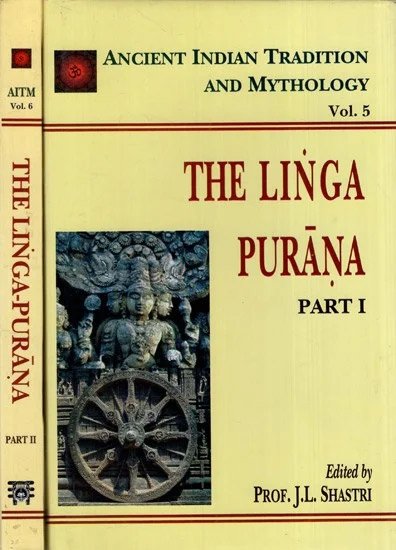The Linga Purana
by J. L. Shastri | 1951 | 265,005 words | ISBN-10: 812080340X | ISBN-13: 9788120803404
This page describes The eight-syllabled Mantra which is chapter 8 of the English translation of the Linga Purana, traditionally authored by Vyasa in roughly 11,000 Sanskrit verses. It deals with Shaiva pilosophy, the Linga (symbol of Shiva), Cosmology, Yugas, Manvantaras, Creation theories, mythology, Astronomy, Yoga, Geography, Sacred pilgrimage guides (i.e., Tirthas) and Ethics. The Lingapurana is an important text in Shaivism but also contains stories on Vishnu and Brahma.
Chapter 8 - The eight-syllabled Mantra
Sūta said:
1-7. O excellent brahmins, the eight-syllabled[1] mantra viz. “oṃ namo nārāyaṇāya” and the twelve-syllabled[2] mantra, viz. “oṃ namo bhagavate vāsudevāya” are the greatest mantras of the great Ātman. O brahmins, the six-syllabled[3] mantra, viz. “oṃ namaḥ śivāya” connotes the entire meaning of all the Vedic passages. This mantra is the means of achieving all objects. The divine five-syllabled mantra “Śivatarāya” is very auspicious. So also is the mantra “mayaskarāya” [(obeisance) to one who brings about excellence], The mantra of seven syllables, viz. “namaste śaṅkarāya” is the mantra of Rudra, the Puruṣa (in conjunction with) Pradhāna. O excellent brahmins, Brahmā, lord Viṣṇu, Devas including Indra and the sages worship Śaṅkara, the lord of the chiefs of Devas with these mantras. They worship Siva, the source of origin, of Brahmā, and the consort of Umā, the lord of Devas (with these mantras). They say continuously “namaḥ śivāya”, “namaste śaṅkarāya”, “mayaskarāya”, “rudrāya” and “śivatarāya”. By repeating these (mantras) a brahmin is instantaneously liberated from the sins of brahmin-slaughter, etc.
8-12. Formerly, in the Meghavāhana kalpa of Brahmā[4] the great Ātman, in the third manvan tara, in the Tretā yuga there was a certain powerful brahmin Dhundhumūka. That kalpa is called Meghavāhana because Viṣṇu the lord of Devas assumed the form of a cloud and performed penance in propitiation of Mahādeva, the hide-clad lord, Rudra. Thanks to his high reverence for Rudra, he performed penance leaving off the Intake and expiration of even breath. He was overwhelmed and dejected due to too much of burden. He submitted his problem to the blue-necked lord. The lotus-eyed lord performed penance and as a result acquired wonderful strength from Śaṅkara the great Ātman.
13-14. In that Meghavāhana kalpa, due to the curse of a sage the son of Dhundhumūka became wicked. Formerly, Dhundhumūka had been deluded by his wife. He was too much attracted by her. A foetus was procreated by him in her with his mind drawn by lust.
15. It was on the Amāvasyā day, during the day time in the course of Rudra muhūrta[5] that his pregnant wife was enjoyed by him.
16-20. Her name was Viśalyā. With great strain, she gave birth to a son, O excellent sages, in Rudra muhūrta aspected by Saturn. He became an unlucky omen unto his father and mother as well as unto himself. The excellent sages Mitra and Varuṇa,[6] O brahmins, said to Dhundhumūka in secret that he was a wicked son. Vasiṣṭha said—“Although he is base and wicked, this son of yours will be liberated from sins by the prowess of Bṛhaspati (Jupiter). O excellent brahmins, Dhundhumūka became dejected on seeing the son in such a plight. He himself performed the postnatal and other rites for him. Thereafter, he taught him the Vedas.
21. O sages of good holy rites, everything was perfectly learnt by the son of Dhundhumūka. His marriage was performed and he became interested in serving his father.
22-23. O excellent sages, in the height of his arrogance this son of Dhundhumūka sought a Śūdra woman and enjoyed her like his wife by day and by night sitting with her in the same seat and lying with her in the same bed. The base brahmin the son of Dhundhumūka, of wicked intellect, eschewed the great path of virtue.
24-30. Wine was drunk by him along with her for the excitement of his lust. But, O excellent brahmins, for some vague reason that inauspicious Śūdra woman was killed by that sinner. Thereupon his father, mother and the legal wife of the wicked son of Dhundhumūka were killed by her brothers. O sages of good holy rites, those brothers-in-law were also killed by the king. Thus her and his families were destroyed in an instant. The son of Dhundhumūka went here and there in the course of his sporting activities. Somehow, he saw an excellent sage engaged repeating Rudra’s names. At the outset he obtained the Pāśupata mantra of lord Maheśvara. After attaining the five-syllabled mantra and the six-syllabled mantra he repeated them a hundred thousand times severally. He performed the divine holy rite in accordance with the injunctions for a period of twelve months. In the course of that kalpa he passed away and was welcomed by Yama.
31-36. O sages of good holy rites, his mother, father, brothers-in-law, and the fortunate wife were redeemed. The chaste lady remained smiling. Along with them he got into an aerial chariot. He was eulogised by Devas including Indra. He attained the chieftancy of the Gaṇas and became a favourite of Rudra. Hence, merit is increased ten million times due to the eight-syllabled and twelve-syllabled mantras. No doubt need be entertained in this respect. Hence, he who continuously repeats these mantras in accordance with the injunctions laid down before[7] and in combination with the mantra of Śakti attains the greatest goaL This excellent story has thus been entirely mentioned to you. He who reads, listens or recounts it to excellent brahmins goes to the world of Brahmā.
Footnotes and references:
[1]:
aṣṭāksara [aṣṭāksaraḥ]—the eight-syllabled mantra: “oṃ namo nārāyaṇāya”.
[2]:
dvādaśākṣara [dvādaśākṣaraḥ]—the twelve-syllabled mantra: “oṃ namo bhagavate vāsudevāya”.
[3]:
ṣaḍakṣara [ṣaḍakṣaraḥ]—the six-syllabled mantra: “oṃ namaś śivāya”.
[4]:
brahmaṇa [brahmaṇaḥ]—“paramātmanaḥ śivasya” Śivatoṣiṇī. of the transcendental lord Śiva.
[6]:
mitrāvaruṇa-nāmānau—in this context Mitra and Varuṇa refer to certain sooth-sayers.
[7]:
prāguktena—here the reference is to the eighty-fifth chapter, Part I.
